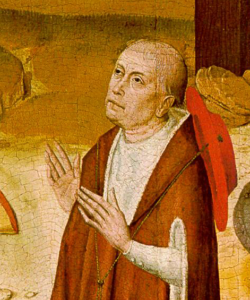Previous Events
International Medieval Congress
Leeds, 1-4 July 2024
The Cusanus Society UK & Ireland organised sessions for the IMC Leeds 2024 (1-4 July).
Sponsor: Cusanus Society UK & Ireland
Organiser: William P. Hyland, School of Divinity, University of St Andrews
Moderator: Sean Barrett, St Andrews Institute of Mediaeval Studies / School of Divinity, University of St AndrewsPapers
Nicholas of Cusa and John Wenck on Representing God: A Disagreement at an Epochal Shift
Andrés García-Rengifo, Kueser Akademie für Europäische Geistesgeschichte
Friends, Foes, and Friends Again: Cusanus and the Scottish Cistercian Bishop, Reformer, and Conciliarist Thomas Livingston
William P. Hyland, School of Divinity, University of St Andrews
Thomas Livingston’s Epiphany Sermon 1433: Early Basel Conciliarism and the Metaphysics of Light
Simon J. G. Burton, School of Divinity, University of Edinburgh
Sponsor: Cusanus Society UK & Ireland
Organiser: William P. Hyland, School of Divinity, University of St Andrews
Moderator: William P. Hyland, School of Divinity, University of St AndrewsPapers
Scrutinising of the Scrutiny of the Koran
Zahra Abdolahi, Faculty of Humanities, Sharif University of Technology,
Tehran, IranCusanus’ Solution to Overcome the Crisis of Human Knowledge:
Decentring and Recentring Human Capacity to Know in the Light
of Human Dynamic mens and PerspectivismMaude Corrieras, Independent Scholar
The Motionless at Motion: A New Approach to the Problem of
Motion in Theology in the Grame of Nicholas of Cusa’s
Dialogue De PossestAli Abbasi, Medical School, Shahid Beheshti University, Tehran
Cusanus and Parametric Ontology
Amirhossein Sanayei, Department of History & Philosophy of Science,
Institute for Humanities & Cultural Studies, Tehran
International Medieval Congress
Leeds, July 2023
The Cusanus Society UK & Ireland co-sponsored the following session 531 with Cartusiana, on Tuesday 4 July.
Sponsors: Cusanus Society of UK & Ireland, and Cartusiana
Organisers: Tom Gaens, Ruusbroecgenootschap, Universiteit Antwerpen and Stephen J. Molvarec, School of Theology & Ministry, Boston College, Massachusetts
Moderator: William P. Hyland, University of St AndrewsSession description:
During the Later Middle Ages, Carthusian monks became increasingly entangled in intellectual networks and ideas of mystical reform. This session’s papers explore Carthusian involvement in the circulation of reformist ideas in a later medieval context. Instances of reformist entanglement treated range from the creative tensions in Denys the Carthusian’s scriptural commentaries, to the role of mysticism in Nicholas of Cusa’s and Denys the Carthusian’s joint endeavour at the Council of Basel and Cusa’s reforming visitation of 1450-1451, to the production and transmission of textual witnesses central to the Melk Reform. Each paper attempts to reconstruct intellectual networks and the dynamics of dissemination of new ideas.
Papers:
1) Intellectual Networks and Authorities: How Denys the Carthusian in his Scripture Commentaries Utilised Thomas Aquinas and Nicholas of Lyra
William P. Hyland, School of Divinity, University of St Andrews
2) Ecclesia semper reformanda: Mystical Reform in Nicholas of Cusa and Denys the Carthusian
Simon J.G. Burton, School of Divinity, University of Edinburgh
3) New Books for New Ideas: The Production and Transmission of Texts Within the Benedictine Network of the Melk Reform
Astrid Breith, Institut für Mittelalterforschung, Österreichische Akademie der Wissenschaften, Wien
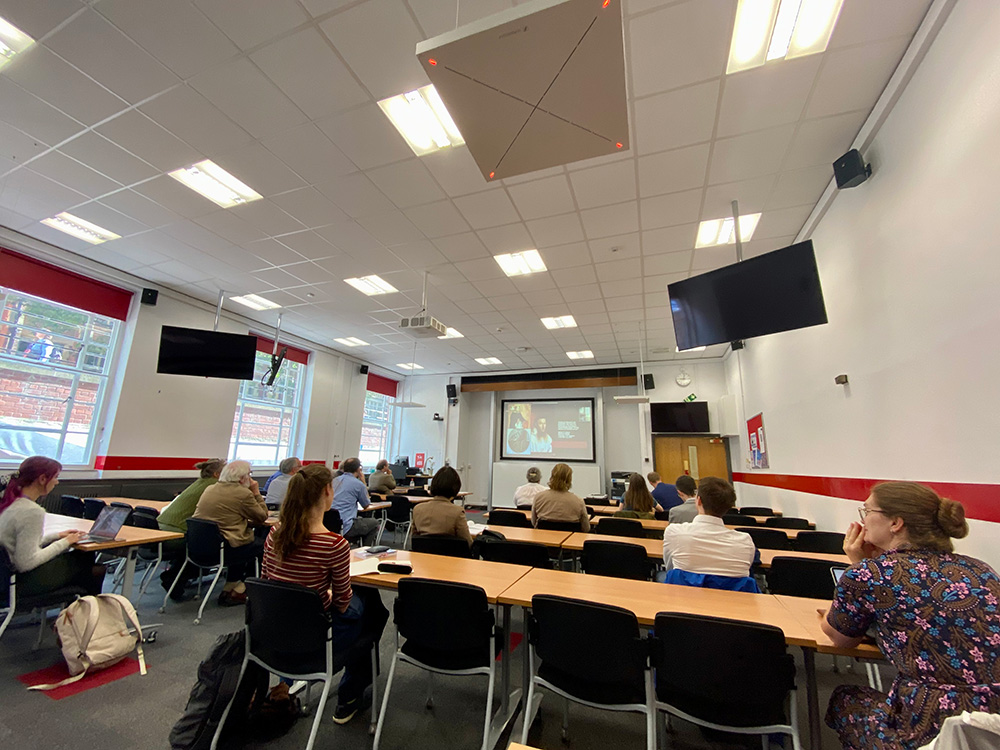
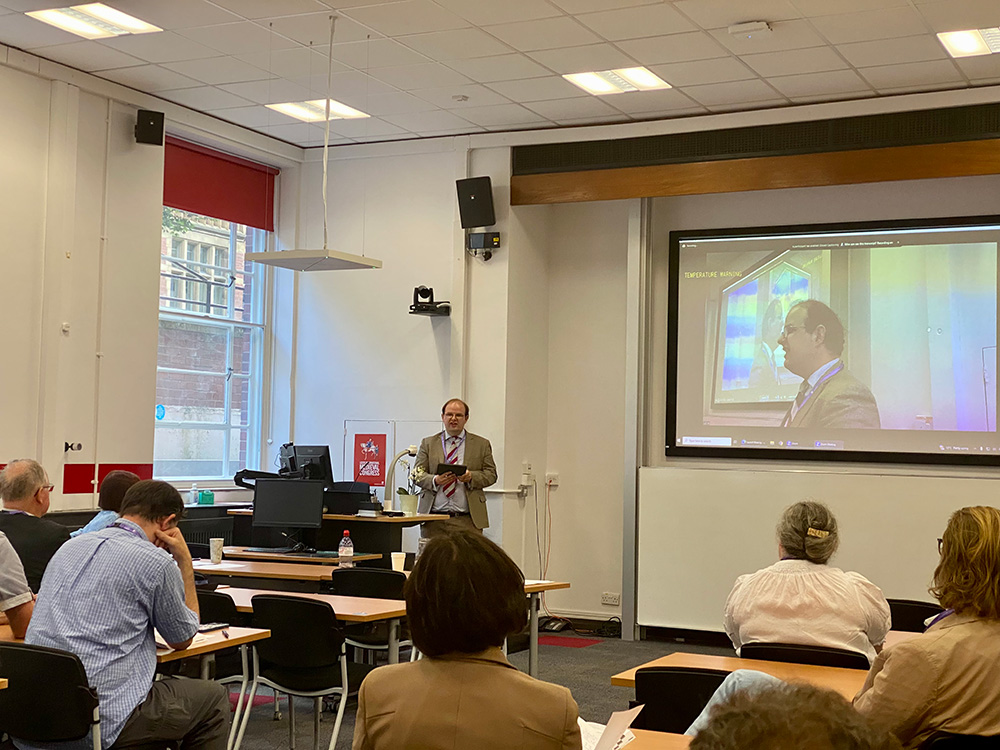
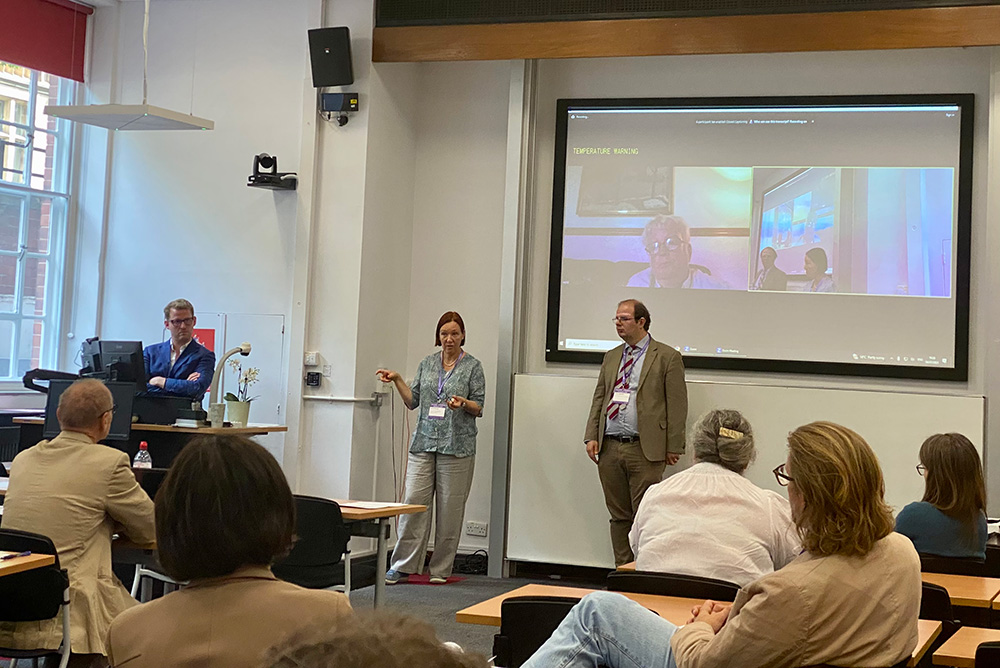
Cusanus Society UK & Ireland
First annual conference
Tuesday 20 to Wednesday 21 June 2023,
University of St Andrews, St Andrews, Scotland, UK
The Cusanus Society UK & Ireland held its first annual conference 20-21 June 2023 in St Andrews in conjunction that week with the annual meeting of the European Academy of Religion.
With thanks to St Mary’s College (School of Divinity), University of St Andrews and the School of Divinity, University of Edinburgh for their support of this conference.
We are delighted that our two plenary speakers were:
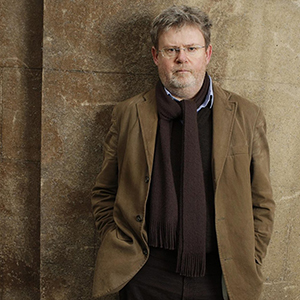
Professor John Milbank
Emeritus Professor & Director of the Centre of Theology and Philosophy, University of Nottingham.
Dr Richard Oosterhoff
Senior Lecturer in History, University of Edinburgh.All Sessions took place in Parliament Hall, South Street, St Andrews.
20 June
Session 1 – Cusanus, Reform and Ecclesiology
Tuesday 9am to 10amOpening Remarks & Welcome
Moderator: William P. Hyland. University of St Andrews.
Paper 1: Monika Eisenhauer. Independent Scholar.
“Nicholas Cusanus’ Reformatio Generalis: Theology and Church Reform”.Paper 2: Yelena Mazour-Matusevich. University of Alaska, Fairbanks.
“Nicholas of Cusa and Jean Gerson: A Meaningful Relationship”Session 2
Tuesday 10.15am to 11.15am
Plenary SessionJointly sponsored by the St Mary’s College (School of Divinity), University of St Andrews & the St Andrews Encyclopaedia of Theology.
Moderator: Judith Wolfe. University of St Andrews.
Speaker: John Milbank. University of Nottingham.
Plenary Paper: “Why the theological future is Cusan rather than Thomist”
For all the continuing value of Aquinas when rescued from
neo-scholastic confusions, the approach of Cusa more points the way forward for
us today. His fusion of Albertinism, Eriugena and Chartrian humanism in a
post-nominalist context allowed him to begin to develop a new discourse of
participated creativity that refused any distinction between theology and
philosophy, or any thinking of monotheism that is not also Trinitarian and
Christological, while remaining more strictly monotheistic and even monistic in
character (and thus open to other religious perspectives). It is in these terms
that he more drastically confronted the inherent paradoxes of the
Creator-Creation relationship than had been the case hitherto. In all such
aspects (which do not anticipate Kant so much as the various currents of
Romanticism) he opened out an ‘alternative modernity’ rather than a mere return
to the pre-modern that is now theoretically and culturally impossible, besides
being less than fully Christian.Session 3 – Cusanus, Truth and Metaphysics
Tuesday 12 noon to 1pmModerator: Simon J.G. Burton. University of Edinburgh.
Paper 1: Sean Hannan. MacEwan University.
“Truth and Timelessness in Augustine and Cusanus”Paper 2: Steven Toussaint. University of Cambridge.
“Ars Infinita: Nicholas of Cusa and the Metaphysics of Skill”.Session 4 – Cusanus, Mathematics and Infinity
2.30pm to 3.30pmModerator: Andrew Torrance. University of St Andrews.
Paper 1: Jean-Marie Nicolle. Société Française Cusanus.
“Nicholas of Cusa and the Mathematical Sciences of his time”.Paper 2: David Albertson. University of Southern California.
“Problems of the Infinite Line.”Session 5
3.45pm to 4.45pmEcumenical Religious Service St Salvator’s Church. North Street.
The service will feature prayer and Scripture readings, as well as a sermon of Cusanus. There will also be period music provided by the choir of St Mary’s Catholic Cathedral, Edinburgh, under the direction of Dr Michael Ferguson, University of St Andrews.
Cusanus Dinner. 6pm Parliament Hall.
21 June
Session 1 – Cusanus, Art and Creativity
Wednesday 9am to 10amModerator: Rebekah Lamb. University of St Andrews.
Paper 1: Il Kim. Auburn University.
“Impressio of God: Cusanus’ Use of Icons, Diagrams and Paintings.”Paper 2: Wade Bellesbach, University of St Andrews.
“Nicholas of Cusa and Martin Luther on Artistic Creativity.”Session 2
Wednesday 10.15am to 11.15am
Plenary SessionSponsored by the School of Divinity, University of Edinburgh.
Moderator: Simon J.G. Burton. University of Edinburgh.
Speaker: Richard Oosterhoff. University of Edinburgh.
Plenary Paper: “The Coercion of Opposites: Renaissance Visions of Peace and Freedom.”
Our narratives of liberal modernity have made mathematical reasoning a focal point of both freedom and coercion. Classic accounts since at least Cassirer take Nicholas of Cusa and other thinkers as examples of how mathematics enables humans to surpass finite bounds in a bid for infinite perspectives; meanwhile, influential critics point out the pernicious consequences of mapping the world, of constraining it within a numbered grid to enable the extractive, surveilling state. This talk attempts to trace an emerging sense—and dismissal—of this tension in the wake of Cusanus. It will use Renaissance assumptions of how to do mathematics to find a way into the tensions between coercion and freedom, and from there examine the place of mathematical regimes in Renaissance political thought.
Session 3 – Cusanus, Idealism and Infinity
Wednesday 12 noon to 1pmModerator: Oliver Crisp. University of St Andrews.
Paper 1: Jovino de Guzman Miroy. Ateneao de Manila University.
“Narrative and Inquiry in the Thought of Nicholas of Cusa.”Paper 2: Valentina Zaffino. Pontifical Lateran University, Vatican State.
“Cusanus and Hegel on the Notion of Visio.”Session 4 – Cusanus, Exegesis and Reformation
Wednesday 2.30pm to 3.30pmModerator: William P. Hyland. University of St Andrews.
Paper 1: Sean Barret. University of St Andrews.
“Consent and Scriptural Exegesis in the Writings of Cusanus: The Case of Luke 1:38.”Paper 2: Andrea Hugill. Independent Scholar.
“John Jewell’s Reception of Nicholas of Cusa: Were the Epistles to the Bohemians Proof of Hypocrisy in the Church of Rome?”Session 5 – Cusanus, Mysticism and Devotion
Wednesday 3.45pm to 4.45pmModerator: Mark Elliott. University of Highlands and Islands.
Paper 1: Simon J.G. Burton. University of Edinburgh.
“Beatific Vision or Embrace? The Case of Denys the Carthusian and Nicholas of Cusa”Paper 2: Tom Gaens. Ruusbroec Institute, University of Antwerp.
“In between Ruusbroec and Cusanus: Henry of Coesfeld’s devotional theology and its influence on Nicholas of Cusa.”Closing Remarks
Optional Free Walking Tour of some St Andrews Religious Sites (Weather permitting: we’ll finalize the decision at the end of Session 6). Led by Bill Hyland. (Approximately 1hr). Meet inside the gate of St Mary’s College on South Street; we’ll leave promptly at 5.00pm.
The Cusanus Society UK & Ireland gratefully would like to thank the School of Divinity, University of St Andrews; the School of Divinity, University of Edinburgh; and the St Andrews Encyclopaedia of Theology for their generous financial and logistical support.
Dr Ooesterhoff is sponsored by:

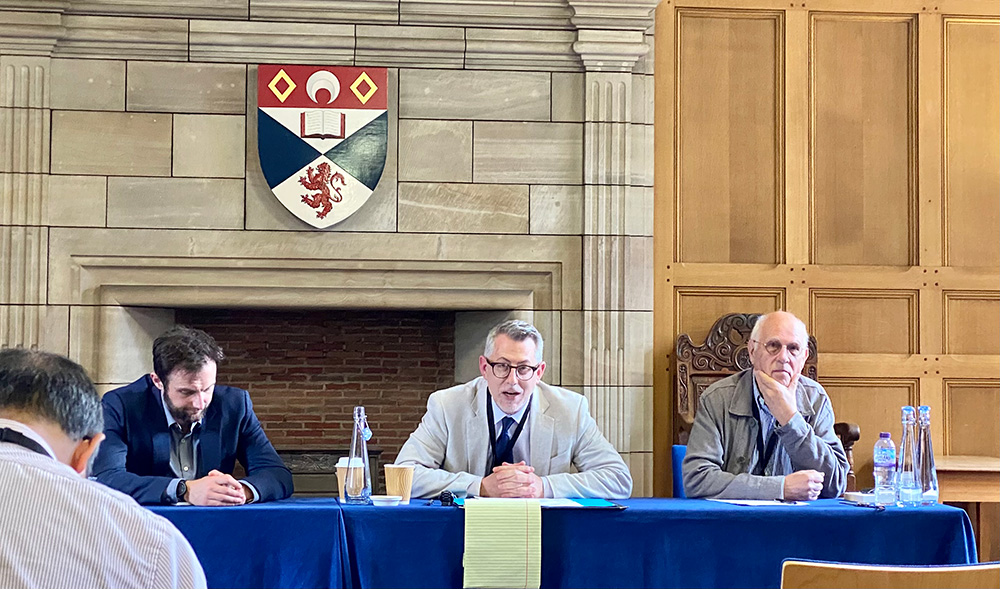
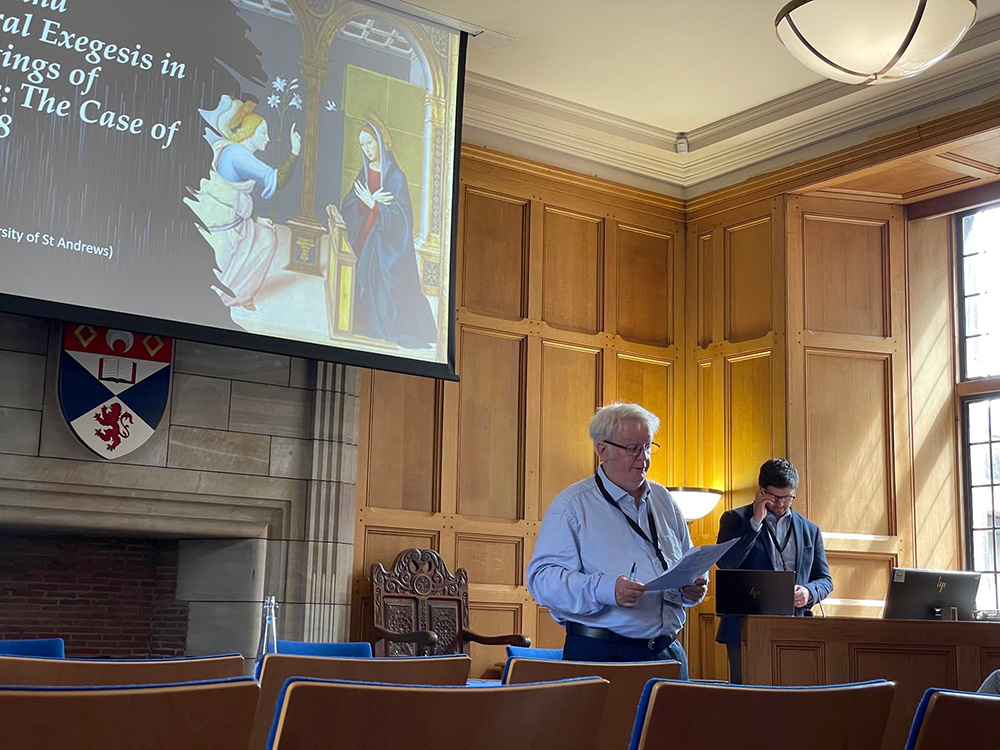
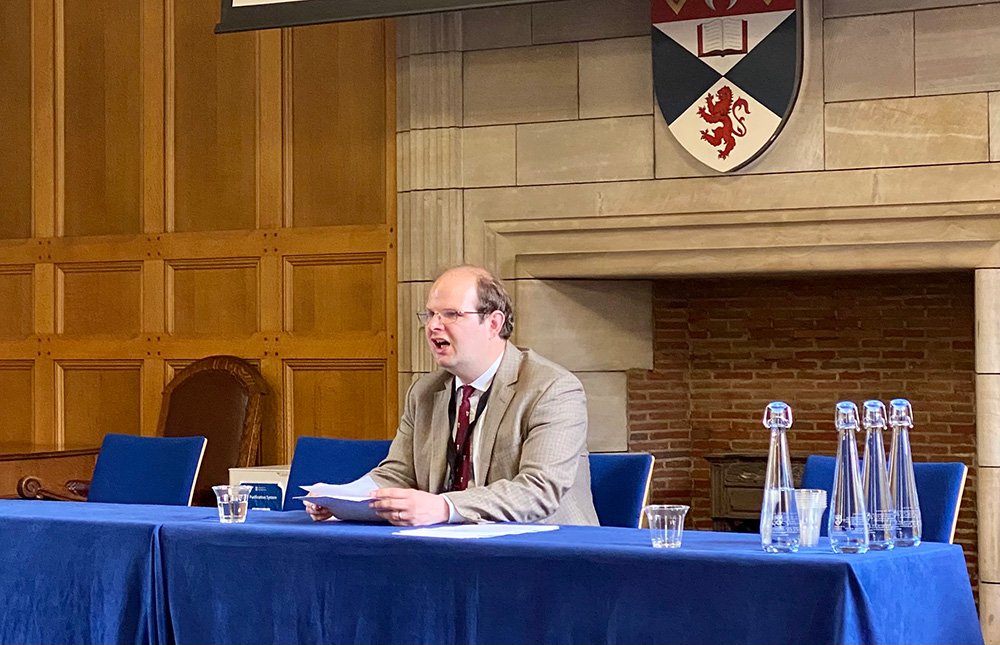
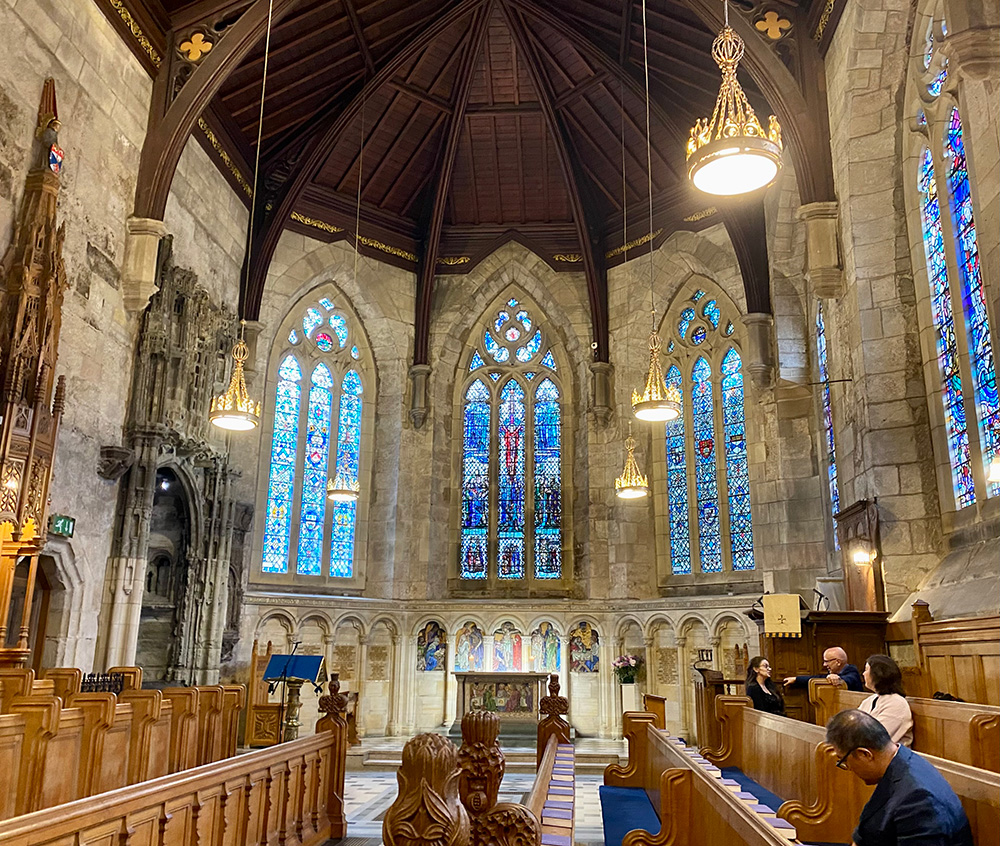
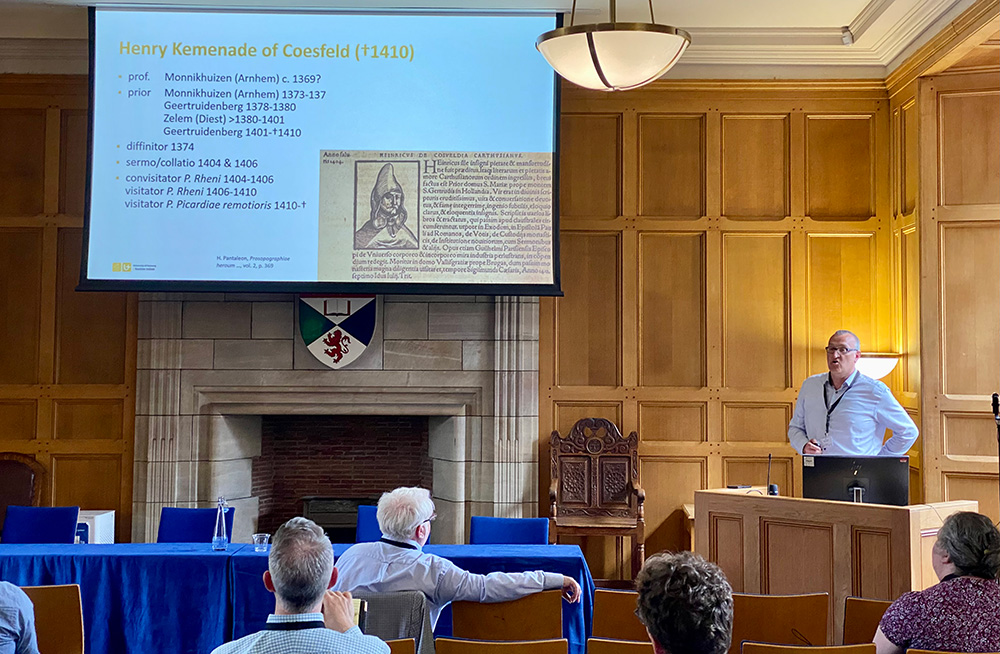
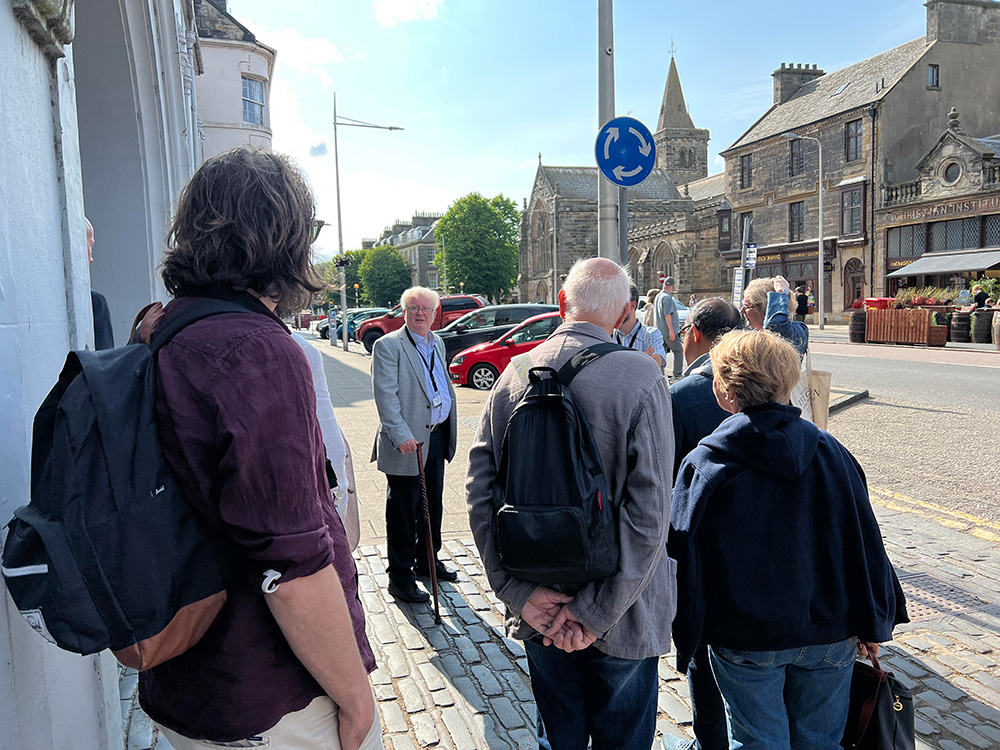
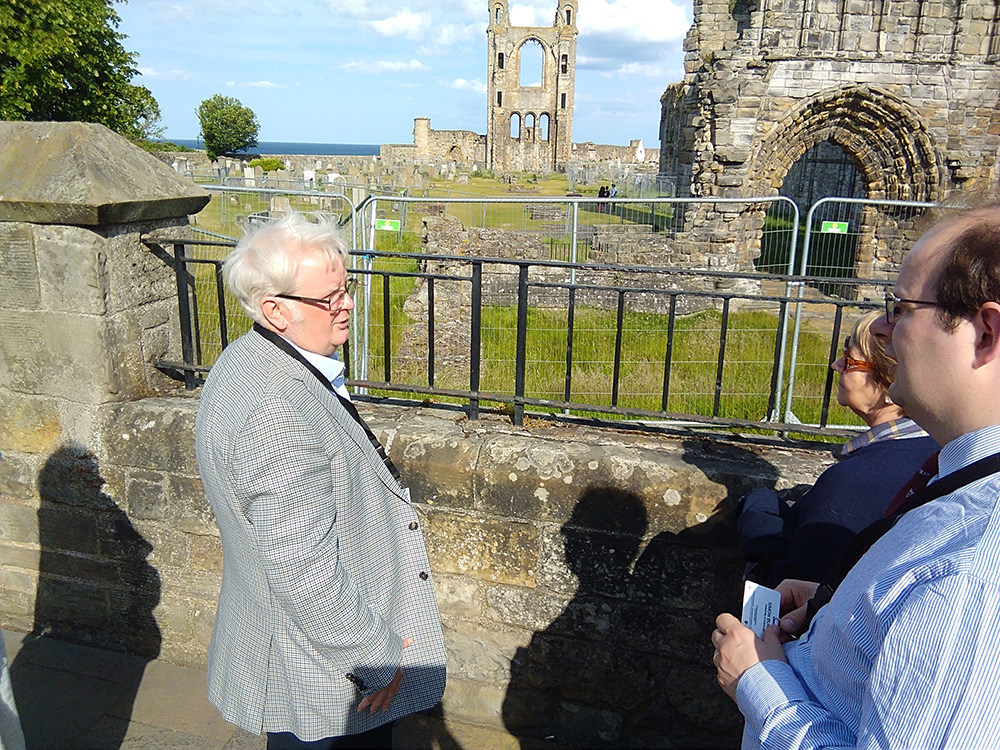
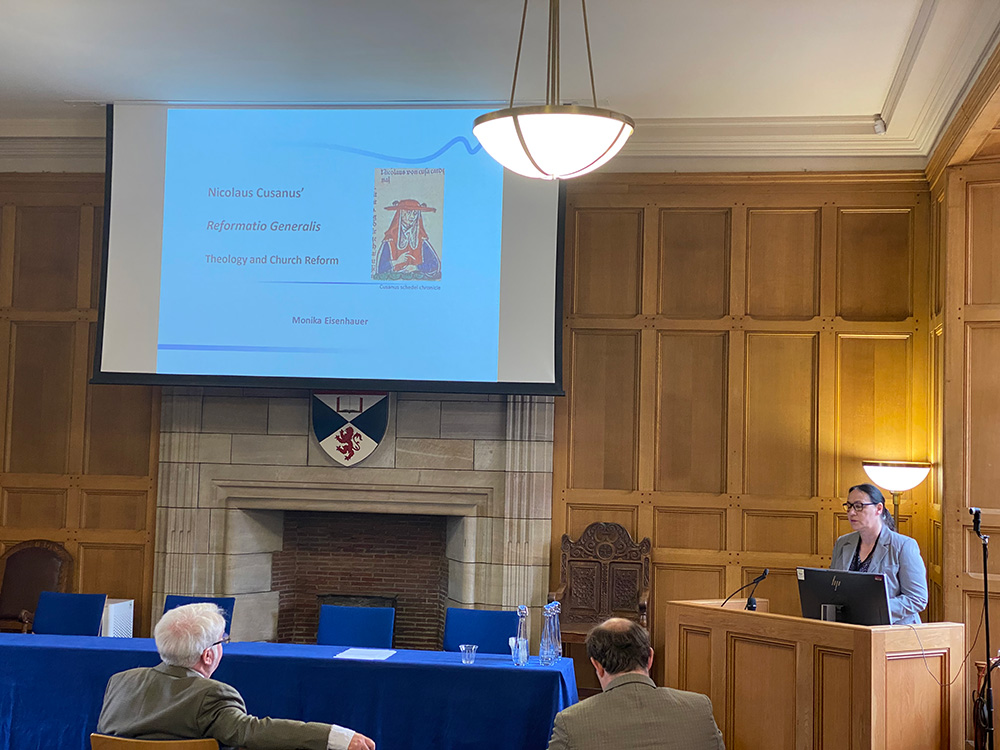
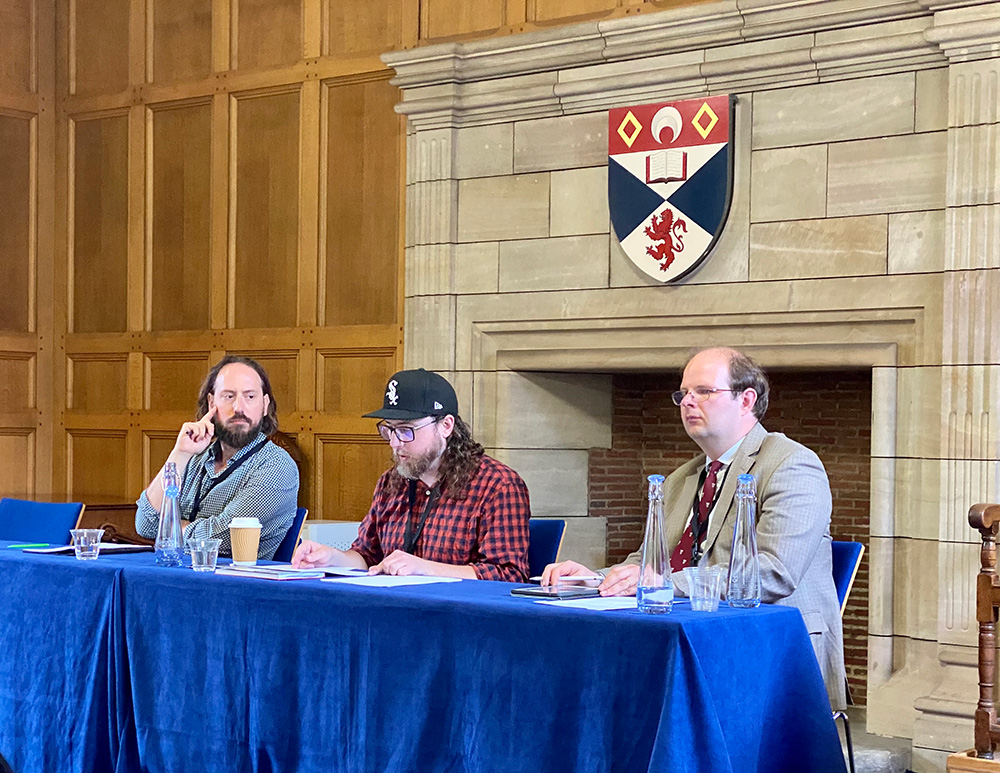
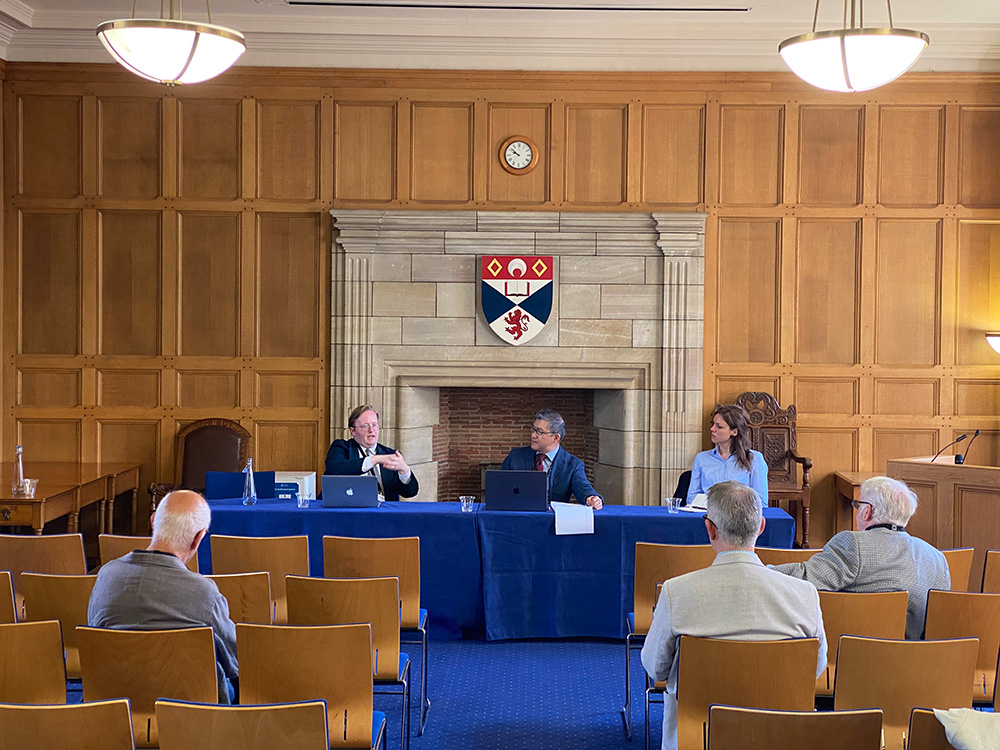
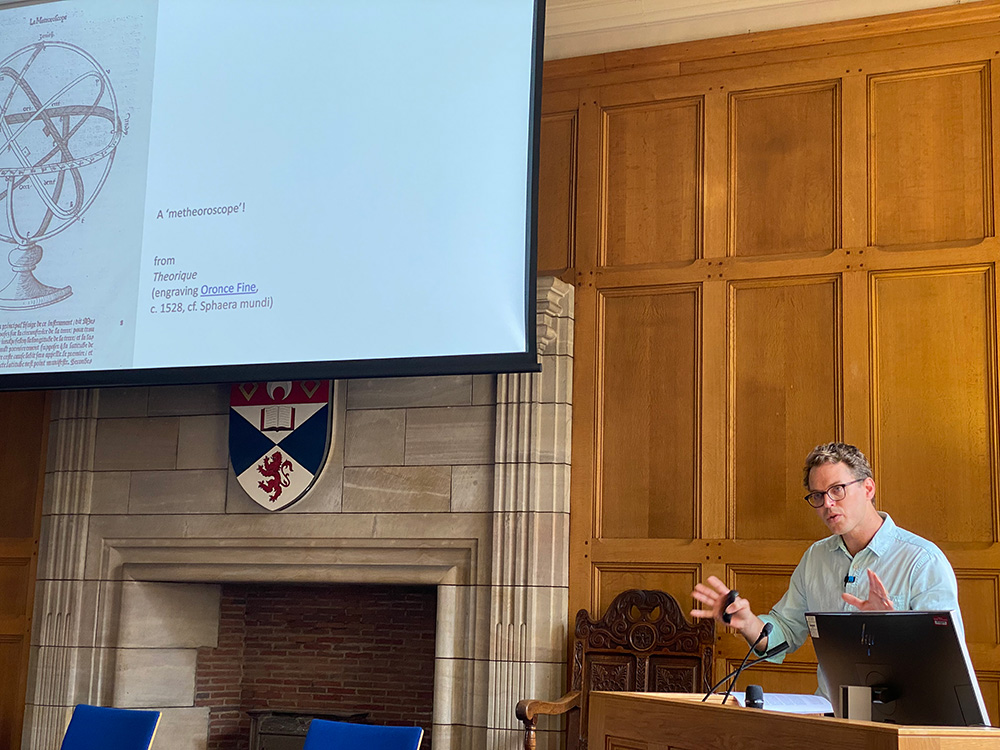
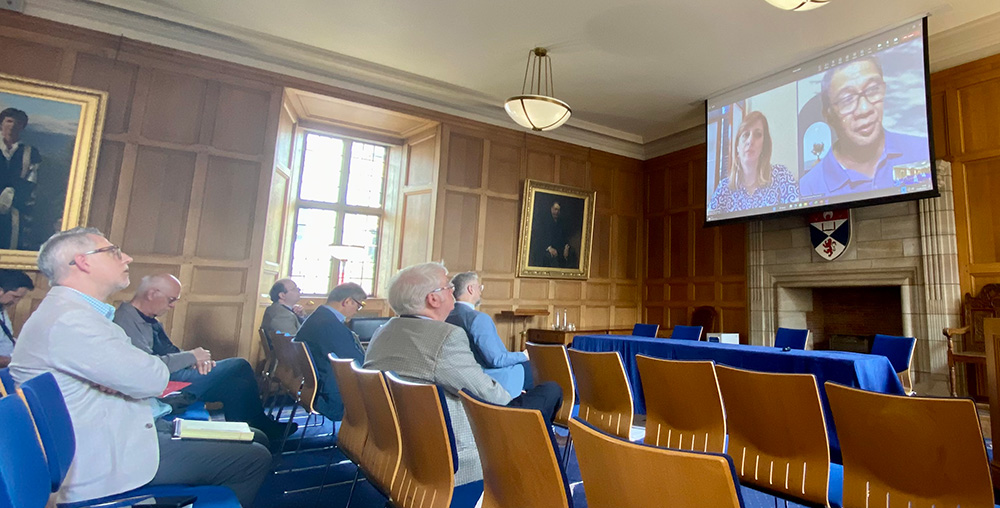
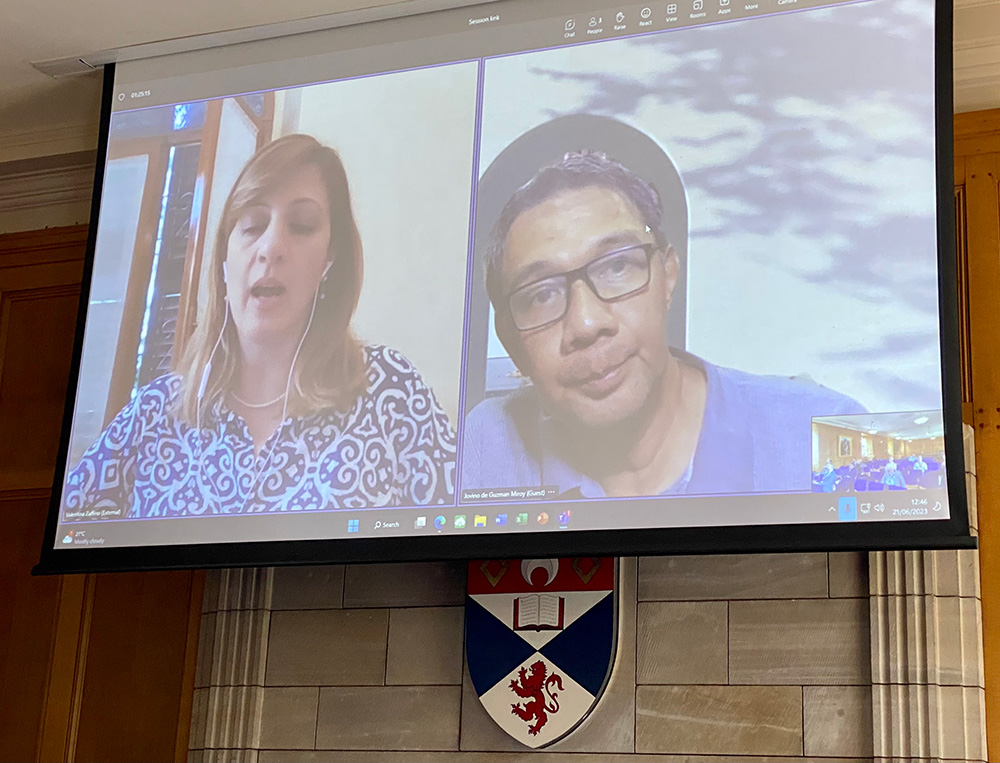
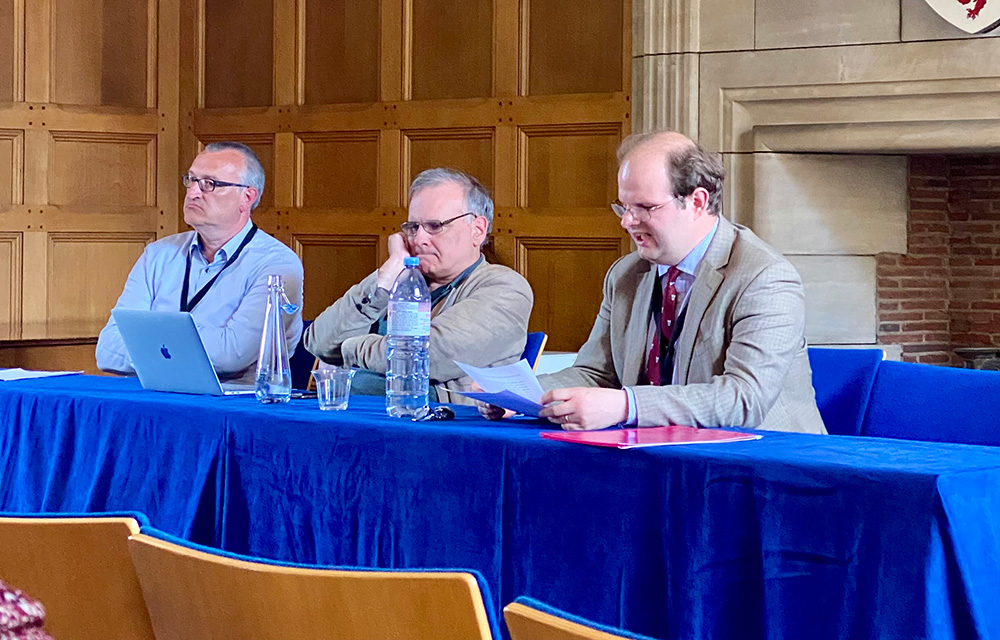
Recorded lectures
International Medieval Congress
Leeds, July 2022
The following sessions were sponsored by the Cusanus Society of UK and Ireland at the International Medieval Congress Leeds 2022. Our three sessions were held Thursday 7 July.
Sponsor: Cusanus Society of UK & Ireland
Organiser: Simon Burton, University of Edinburgh
Moderator: William P. Hyland, University of St AndrewsPanel title and abstract:
Nicholas of Cusa, I: Cusa’s De Visione Dei in Perspective
Nicholas of Cusa’s De Visione Dei is one of the most important mystical works of the Late Middle Ages. It has long fascinated scholars for its ground-breaking treatment of themes of vision, perspective and community in the mystical ascent, as well as its emphasis on the individual in their relationship to God. The papers in this session seek to offer new approaches to this seminal work, bridging sociology, metaphysics and theology.
Papers:
A) Traces of a Social Constructivist Pedagogy in Nicholas of Cusa’s De visione Dei
Greta Venturelli, Universitá degli studi di Torino
In De visione Dei (1453) Nicholas of Cusa proposes to the monks of Tegernsee the experience of a new game: the ludus iconae. Based on sensible experience, gnoseological perspectivism and social dialogue, this game looks like a didactic method, which could be related to a social constructivist pedagogy. Actually, according to Cusa’s critical realism and his teaching of the docta ignorantia, all monks’ different and subjective points of view are harmonized into a common and provisory perspective. In this way, they practise the conjectural art of (re-)building social reality in an asymptotical and continuous movement towards the truth.
B) Nicholas of Cusa’s De visione Dei: Origin and Effect
Monika Eisenhauer, Independent Scholar, Zwingenberg
When Aristotle formulated the question of a happy life, his answer was a description of virtuous behaviour leading to the earthly beatitudo as the highest good. Centuries later, the vision of God was at the centre of theology when Aquinas redefined Aristotle’s beatitudo in the theological context and thus transformed it into a metaphysical event. On the one hand, Cusanus’ De visione Dei recurs to the beatitudo, on the other hand it includes older elements, too. In this way, Cusanus introduced something new and thus influenced the historical development: The personified God now looks back and in turn recognises man.
C) The One and the Many in Nicholas of Cusa’s De Visione Dei
Miguel Belrán Munar, University of the Balearic Islands, Spain.
Nicholas of Cusa’s De Visione Dei contains his view concerning the relationship of the One and the Many, introduced by his explanation of the unfolding of creation. Our objective is to apprehend the motives that magnifies the apparition of particularity and its significance for the aim of apprehending God. Both multiplicity and diversity are manifestations of the Infinity, and God’s infinite power needs to be expressed through the many faces of the finite, which introduce the possibility of the dialogue that makes real the reaching of the absolute and infinite truth.
Sponsor: Cusanus Society of UK & Ireland
Organiser: Simon Burton, University of Edinburgh
Moderator: William P. Hyland, University of St AndrewsPanel title and abstract:
Nicholas of Cusa II: Peace and Politics in the Cusan Tradition
Nicholas of Cusa was one of the most important political and ecclesiological thinkers of the fifteenth century. This session considers Cusa’s engagement with Islam and other religions in his celebrated De pace fidei. It also considers the legacy of Cusa’s Conciliarism in the sixteenth century. In doing so, it explores the complex relation between politics and the quest for peace and consensus in the Late Middle Ages.
Papers:
A) Countering Islam in Cusanus, Juan de Segovia, and Libellus to Leo X: A Comparison
Christopher Bellitto, Kean University, New Jersey
If Islam was seen as a Christian heresy, a standard medieval interpretation, the church’s battle against Muslims had to be seen in ad intra terms. This approach leads us to examine Cusanus’ De pace fidei (1453) and Cribratio Alkorani (1461) from the analogous perspective of internal crusades against the Hussites. Juan de Segovia, who did not see Islam as a Christian heresy, favored negotiation instead of ad extra crusade. Tomasso Giustiniani and Vincenzo Querini in their Libellus ad Leonem decem (1513) pushed the Medici pope to counter Islam using language of the just war tradition and seeing Islam as a Christian heresy.
B) Christian Peace: Cusanus’ Exclusive Peace Conception as reflected in his writings
Nathan Ron, Haifa University
Miroslav Volf, in his Allah: A Christian Response (2011), ascribes to Cusanus an unequivocal anti-crusade stance. I argue that Cusanus was far from being a pacifist. De pace fidei (1453) is indeed irenic in its contents and spirit. However, it does not necessarily mean an anti-war or anti-crusade stance of Cusanus. De pace fidei explicitly reflects a pursuit of Christian peace, i.e., peace of Christians, by Christians, for Christians – concordia. As a rule, Cusanus does not deal with peace in his philosophical works. However, an allusion to his conception of Christian peace is found in his De docta ignorantia: peace must be Christian. Thus, non-Christians, such as Muslims, can enjoy it – if they abandon their religion and join Christianity.
C) Cusanus’ Influence on the Tudor Dynasty
Andrea Hugill, Trinity College in the University of Toronto
The institutional structures of the Tudor dynasty, including the English Church, were influenced by late medieval ecclesiology, to which Cusanus was a key contributor. The reception of Cusanus’ works in the Tudor era has been well-documented, for example by Thomas Izbiciki, and by Gary Jenkins and Andre Gazal, who have investigated the use of Cusanus by John Jewel, Bishop of Salisbury. This paper seeks to address the lacuna in research on the relationship of the Tudors and late medieval ecclesiology, by unpacking the specifics of Cusanus’ theology in order to critically assess his influence on the Tudor dynasty.
Sponsor: Cusanus Society of UK & Ireland
Organiser: Simon Burton, University of Edinburgh
Moderator: Christopher M. Bellitto, Kean University, New JerseyPanel title and abstract:
Nicholas of Cusa III: Cusan Christology and Mariology
Nicholas of Cusa has long been recognised as a major Christocentric and mystical theologian. However, Cusa’s Christology has often been treated as stand-alone and thereby disconnected from wider currents of late medieval theology and piety. The papers in this session seek to redress this by placing Cusa’s Christology and passion mysticism in the framework of the Long Reformation. They also present for the first time a discussion of Cusa’s innovative Mariology.
Papers:
A) Mariological Themes in Cusanus’ Brixen Sermons
William Hyland, University of St Andrews
In his earliest sermons for various Marian feast days, Nicholas of Cusa had developed a robust Mariology. As bishop of Brixen in 1457 Cusanus preached in his cathedral for various festivals of the church year. This paper will discuss sermons 278 for Candlemas and 266 for Good Friday, respectively. In the sermon for Candlemas the bishop will enunciate approvingly the place of pre-Christian ritual in Christian faith and practice. In his sermon for Good Friday, Mary is the primary speaker in a dramatic presentation that not only contains key teachings about the meaning of the Passion, but also relates the faithful’s experience of the Passion to art found in churches and elsewhere.
B) Nicholas of Cusa, Denys the Carthusian and Christocentric Mysticism
Simon J. G. Burton, University of Edinburgh
Nicholas of Cusa and Denys the Carthusian are two of the most important mystics of the fifteenth century. As Erich Meuthen has shown the two knew each other well and were engaged in a common reform of the Church grounded on mystical theology and the devotio moderna. The two also shared a common foundation in Christian Neo-Platonism and Dionysianism. This paper explores their commitment to Christocentric mysticism against the backdrop of the Tegernsee mystical debates of the 1440s and 50s. It focusses especially on their debt to Bonaventure’s Christocentric theology and theological anthropology as a way of recontextualising their distinctive fusion of intellective and affective mysticism in the soul’s ascent to union with Christ
C) Freely Forsaken: The Significance of Cusa’s Non Aliud Principle for Calvin’s Theology of the Cry of Dereliction
Preston Hill, Richmont Graduate University, Tennessee
In De Li Non Aliud, Nicholas of Cusa elaborates a radically non-competitive relationship between God and the created order based on his understanding of God’s absolute transcendence. This non aliud principle—that God is “not another thing” among other finite things—has been celebrated as an apt summation of the Creator-creature relation in classical Christian thought. In this paper I intend to show how a similar non aliud principle governs the Christology of 16th century Reformer John Calvin, particularly in his understanding of how Christ’s creaturely cry of dereliction could be an experience of the divine Logos. Cusa’s understanding of the asymmetrical Creator-creature relation can help illumine Calvin’s own understanding of the non-competitive relation between divine and human agency in Christ’s descent into hell. Moreover, this comparison can help fortify my previous assertion that Cusa’s theology exerted clear causal influence in the theological currents of early French Reform within which Calvin developed his own theology of the descent into hell.


International Medieval Congress
Leeds, July 2021
The following sessions were sponsored by the Cusanus Society of UK and Ireland at the International Medieval Congress Leeds 2021. Our four sessions were held Friday 9 July.
Sponsor: Cusanus Society of UK and Ireland
Organizer: Simon J. G. Burton, University of Edinburgh
Presider: William P. Hyland, University of St AndrewsPanel title and abstract:
Nicholas of Cusa, I: Nicholas of Cusa between Platonism and Aristotelianism
This session will approach the question of the ongoing influence that the availability of new texts, whether in the Aristotelian or Platonic tradition, had on the philosophical thought of Cusanus. It will view the way that Cusanus digested newly available texts, and how they led him to take up new metaphysical positions. Close study of his works reveals that Cusanus’ metaphysical ideas would evolve, and a close examination of the marginalia of certain manuscripts sheds light on this process as it happened.
Papers:
A) The Platonic Turn: The Role of Platonism in Cusanus’s De Principio
Luca Burzelli, Independent Scholar
There is no need to underline that the availability of Plato’s Parmenides, translated into Latin by Trebizond, must have represented a turning point for Cusanus in 1459. The question of divine being and its communication (even verbal, according to the biblical image Tu quis es?) stands from the very first lines of the treatise De principio. Nevertheless, one cannot but detect an increasing attention for the problem of the One and its priority to Being. The purpose of this talk is to explore the relation between these first two hypostases according to the last paragraphs of De principio and to verify if the conclusion (§ 39) is coherent with Cusanus’ previous and following works.
B) Cusanus, Reader of Aristotle’s Metaphysics: The Marginalia of the Codex Cusanus 184 (Bernkastel-Kues, St Nikolaus-Hospital)
Salvatore Carannante, University of Pisa
Among the manuscripts from Cusanus’ library and preserved in the Cusanusstift, a special place is occupied by the Codex Cusanus 184, namely an exemplar of the Aristotelis Metaphysica translata a Bessarione. The margins of this manuscripts are in fact filled with notes, comments and glossae, by Cusanus’ own hand, which show a very careful reading of the text. Focusing on these marginalia, this paper aims to outline the complex relation the Cardinal established with the aristotelian Metaphysica, in order to highlight, more in general, how and with theoretical consequences he read and assimilated one of the fundamental texts of the Western philosophical tradition.
C) Nicholas of Cusa on God as Causa sui
Félix Resch, Faculté Notre-Dame, Collège des Bernardins, Paris
In accordance with Augustine’s De Trinitate, most mediaeval thinkers, including Aquinas, reject the concept of causa sui as self-contradictory. In one of his early sermons, even Nicholas of Cusa dismisses the idea of self-causation. However, some of his later works (De aequalitate, De ludo globi, Sermo CCXVI) attest that this concept reappears within his metaphysics of the divine intellect. This important shift in Cusa’s philosophy, which has never adequately been questioned, still needs to be explained. In my paper, I will try to show why Cusa, unlike Aquinas and Augustine, has finally been driven to consider the Trinitarian God as a causa sui.
Sponsor: Cusanus Society of UK and Ireland
Organizer: Simon J. G. Burton, University of Edinburgh
Presider: Luca Burzelli, Independent ScholarPanel title and abstract:
Nicholas of Cusa II: Cusanus and the Mendicants
This session will contribute to the ongoing process of understanding the role that late medieval thinkers from the various mendicant traditions (in this case Dominican and Franciscan) influenced both the philosophical underpinnings of Cusanus’ speculative theological thought and practical aspects of his presentation of Christian devotion and moral responsibility. In doing so it will offer a new context of mendicant theology and spirituality for evaluating Cusanus’ pioneering role as a late medieval philosopher and theologian.
Papers:
A) Meister Eckhart and Nicholas of Cusa on Determinatio
Antonio Dall’Igna, Dipartimento di Filosofia e Scienze dell’Educazione, Università degli Studi di Torino
The thought of Meister Eckhart displays a radical and corrosive criticism of the determinatio, i.e. the essential element of the spatio-temporal texture. In order to reach the divine condition, human being has to bring into accomplishment the detachment, which entails an operational and conscious conversio from the images of mind and from the will to possess to the apex mentis and the divine love. Even though Nicholas of Cusa is influenced by Eckhart’s theory of detachment, as far as the determinatio is concerned, his thought displays a strong theophanic position: natural and rational beings are considered as divine lights. Both thinkers show a similar mystical approach but a slightly different consideration of the determinatio. Nevertheless, determinatio plays an unavoidable role in the divine and detached man. He has abandoned the fallacy of determinatio, but the divine quantum shines forth in his own determinatio: according to Eckhart and Cusanus, the human form, which cannot be eliminated in the mystical inner deed, is the determinatio which permits the manifestation of the divinity.
B) Re-Evaluating the Franciscan Roots of Nicholas of Cusa’s Coincidence of Opposites
Simon J. G. Burton, School of Divinity, University of Edinburgh
In his Bonaventure and the Coincidence of Opposites Cousins identified an important connection between the Seraphic Doctor and the fifteenth-century Cardinal. More recently, Meier-Oeser has argued, based on a strong textual foundation, that Cusa’s merging of Duns Scotus’ formal distinction with Lullist conceptualities paved the way for his own breakthrough to the coincidence of opposites. Drawing on evidence from the early sermons as well as annotations from the Cusanus’ MS in Bernkastel-Kues this paper argues for a wider connection between Cusa’s emerging methodology and the Franciscan understanding of God and creation. It especially examines Franciscan Trinitarian theology as a locus for reflecting on the relation between identity and distinction within God – an important precondition for the coincidence of opposites. Finally, this paper presents evidence that Cusanus continued to draw on Scotus’ formal distinction to inform his Trinitarian metaphysics of being, even as he distanced himself from Scotist “formalisers” who he felt threatened the simplicity of the divine being. In this way it shows Cusa to have been both participant in and critic of the Franciscan turn in late medieval theology.
C) Cusanus’s Use of Bonaventure in His Sermons
William P. Hyland, School of Divinity, University of St Andrews
The influence of Franciscan thought, including Bonaventure, on Cusanus, continues to be a rich vein of exploration among scholars, both in the realm of philosophy and speculative theology. This paper will attempt to explore the varied use of Bonaventure in the large body of sermons by Cusanus. It will seek to demonstrate the multivalent influence of the Seraphic Doctor, in his various genres, on the way Cusanus over his long and varied career sought to present Christian doctrine and inculcate Christian praxis.
Sponsor: Cusanus Society of UK and Ireland
Organizer: Simon J. G. Burton, University of Edinburgh
Presider: Christopher M. Bellitto, Kean UniversityPanel title and abstract:
Nicholas of Cusa III: Cusanus and Reformation and Early Modern Theology
This session explores the influence of Cusanus on Reformation and early modern theology. It examines aspects of both the Protestant and Catholic Reformations and is wide-ranging in its coverage of doctrine, art, mysticism and debates over epistemology and reason. It considers Cusanus’ impact on Reformation and Counter-Reformation alike. It also reveals him as a seminal figure whose influence can be detected in important and foundational philosophical, theological and aesthetic debates of the Late Middle Ages and early modernity.
Papers:
A) “Dolores Inferni in Anima Sustinuisse”: Christ’s Descent into Hell in the Thought of Calvin, Lefèvre, Pico, and Cusa
Preston Hill, University of St Andrews
In this paper I explore Calvin’s theology of the descent into hell as the Lefèvrian reception of a Cusanisn theme. Although Calvin spends five times more space in the Institutes addressing the descensus than any other clause of the Apostle’s Creed this topic is only passingly treated in existing literature on Calvin, yielding a misunderstanding of its significance for his theology. It is not coincidental that Lefèvre, who famously articulated the same interpretation as Calvin prior to him based on an influential sermon from Cusa, is also underappreciated in Calvin scholarship as a voice pertinent to Calvin’s theological development. Coming to grips with the descensus in Cusa’s sermon (and the relevant claims of Pico’s Apology) and consequently in Lefèvre’s Psalter can shed significant light on the place of Christ’s descent into hell in Calvin’s theology and can demonstrate that Calvin’s interpretation on this topic was far from novel.
B) The Purposes of Visual Art in Nicholas of Cusa and John of the Cross
Emma Mavin, School of Divinity, University of Edinburgh
In De Visione Dei, Nicholas of Cusa uses art as a tool within a mystical path which ultimately discards both image and vision. This theme of apophatic art is also present in the work of John of the Cross (1542 – 1591), whose cautious yet affirmative stance on visual art represents a development of debates over the use of images within mystical theology. This paper aims to illustrate the convergence and divergence of views of art in Nicholas of Cusa and John of the Cross, demonstrating the ways in which mystical theologians continued to engage with the themes of Cusanus’ work in the early modern period.
C) Faith and reason at the dawn of modernity: Nicholas of Cusa and Gisbertus Voetius
Matthew C. Baines, School of Divinity, University of Edinburgh
The renowned Dutch Puritan theologian and pastor Gisbertus Voetius (1589–1676) commended Nicholas of Cusa (1401–1464) as an example of the proper use of reason in matters of faith. This paper will show that Voetius followed Cusa in closely uniting philosophy and theology in Neoplatonic fashion. In doing so, Voetius distinguished his approach from the Aristotelian model, which tended to separate philosophy and theology, and which Voetius believed resulted in atheism in scepticism, most famously exemplified in his arch-opponent Rene Descartes (1596–1650). Thus, this paper will show that Cusa in particular and Renaissance philosophy in general had a more profound effect on early modern thought than has been hitherto recognised.
Co-sponsors: Cusanus Society of UK and Ireland, American Cusanus Society
Organizer: Christopher M. Bellitto, Kean University
Presider: Louise Nelstrop, University of CambridgePanel title and abstract:
Nicholas of Cusa IV: Ecclesiology, church reform, and interreligious dialogue
This panel explores the relationship among ecclesiology, church reform, and interreligious dialogue primarily, but not exclusively, through the lens of Nicholas of Cusa. Sources mined include sermons and treatises with a particular concern with reexamining accepted conventional wisdom about Cusanus’ relationship with the Reformation, papacy, and Islam. The papers marry institutional concerns with spiritual issues by also exploring the lived experience of pastors, bishops, and Christians and Muslims engaged in sometimes-tenuous dialogue.
Papers:
A) Reforming the cura animarum: The Good Shepherd Metaphor in Late-Medieval Sermons
Richard J. Serina, Jr., Lutheran Church-Missouri Synod
Over 100 recorded sermons of the late-fourteenth and fifteenth centuries address the pericope of the Good Shepherd (pastor bonus) from John 10, and many were preached to secular and regular clergy by noted reformers such as Jean Gerson, Nicholas of Cusa, Vincent Ferrer, Denys the Carthusian, Bernardino of Siena, and Jan Hus, among others. This study will address pertinent sermons and their use of the Good Shepherd metaphor in reforming the clergy, and in particular how they view the care of souls in pastoral reform—over against Reformation scholarship that argues the contrary.
B) Cusanus on Correcting Popes
Christopher M. Bellitto, Kean University
Although Nicholas of Cusa is said to have moved from conciliarist to papalist—a portrait this paper will nuance—he was not an uncritical supporter of papal authority. Cusanus believed the pope’s authority was grounded in the faith and office of Peter and not personally in Peter’s successor, who could therefore fairly be corrected. This position meant that bishops, too, participated in the magisterium and could safeguard it from a pope’s actions, especially when gathered in a general council. Cusanus was ambivalent in his position, however, noting that episcopal authority follows from papal authority even as it shares the same source.
C) Ecclesiology and Reform in Nicholas of Cusa’s Encounter with Islam
Joshua Hollmann, Concordia College New York
Nicholas of Cusa’s seminal experience at the Council of Basel and his association with Juan de Segovia and Heymeric de Campo commenced his career long theological consideration of Islam. Ecclesiology and reform form the basis of Cusanus’s encounter with Islam and exegesis of the Qur’an. This study considers the context and content of Cusanus’s ecclesiology and reform in relation to Islam through examining Cusanus’s sources on Islam at Basel and beyond, as well as his writings on Islam, and contends that the Cribratio Alkorani is a new Tome of Leo and the culmination of Cusanus’s engagement with Islam.
International Medieval Congress
Leeds, July 2019
Sponsor: Cusanus Society UK & Ireland
Organiser: William P. Hyland, School of Divinity, University of St Andrews
Moderator: Simon Burton, Wydział ‘Artes Liberales’, Uniwersytet WarszawskiSession abstract
In his public life as preacher, reformer, and ecclesiastical statesman, Cusanus was called upon to comment upon and act in a variety of public situations, many of which involved very difficult issues and opposition. This session will consider his articulation of important positions in some of the key controversial subjects of his day and seek to probe further into his own opinions and actions on issues of war, doctrine, and reform, that have until now not been fully considered by scholars.
Papers
Erasmus and Nicholas of Cusa on War and Peace
(Language: English)
Nathan Ron, School of History, Haifa UniversityNos pie dubitemus: Mariological Themes in the Early Sermons of Nicholas of Cusa
(Language: English)
William P. Hyland, School of Divinity, University of St AndrewsSponsor: Cusanus Society UK & Ireland
Organiser: William P. Hyland, School of Divinity, University of St Andrews
Moderator: Louise Nelstrop, St Benet’s Hall, University of Oxford / Department of Theology & Religious Studies, York St John UniversitySession abstract
Contemporary popular discourses tacitly assume that the relationship between human beings and material artefacts is one of domination: either we control them, or they control us. This session explores how Nicholas of Cusa provides philosophical resources to envisage this relationship outside of the category of power and domination and understands the capacity of artefacts beyond what their human makers ascribe to them, especially insofar as they seem to be capable to mediate ultimate truths. It also explores the speculative function of craftmanship knowledge in Nicholas of Cusa, understood as a heuristic model of conceptualizing reality. It is a technical and supremely practical knowledge, which is nevertheless often metaphorically employed to great effect in various areas of Nicholas’ speculative thought.
Papers
Cusan Materialities: The Role of Artefacts in Nicholas of Cusa’s De Visione Dei, De Possest, and De Ludo Globi
(Language: English)
Silvianne Aspray, Faculty of Divinity, University of CambridgeNature and Dialectic in the Cusan Tradition
(Language: English)
Simon Burton, Wydział ‘Artes Liberales’, Uniwersytet WarszawskiSponsor: Cusanus Society UK & Ireland
Organiser: William P. Hyland, School of Divinity, University of St Andrews
Moderator: William P. Hyland, School of Divinity, University of St AndrewsSession abstract
This section will explore various ontological aspects of the thought of Cusanus, and the ways Cusanus articulated the ontology of number, as well as the Divine Essence and the Being of created things. In doing so it will explore the role of language, paradox, and epistemology in Cusanus’ philosophical speculation, including the question of whether a model of analogia entis might or might not be possible for Cusanus’ Metaphysics.
Paper
The Shape of Being In Cusanus’s Metaphysics
(Language: English)
Luca Burzelli, Classe di Lettere e Filosofia, Scuola Normale Superiore di Pisa

